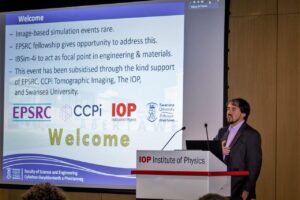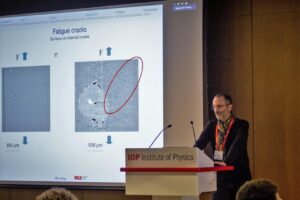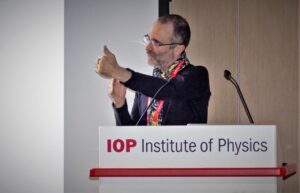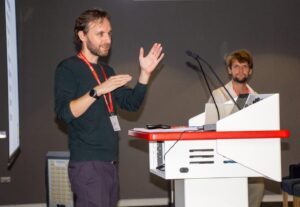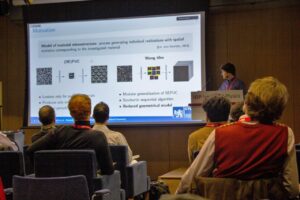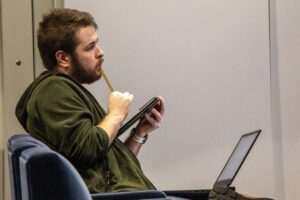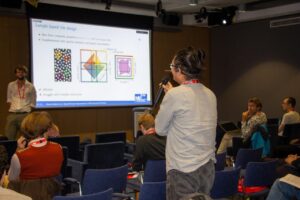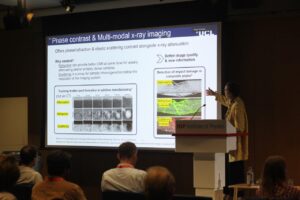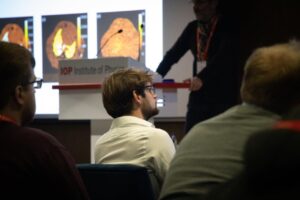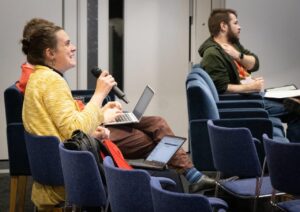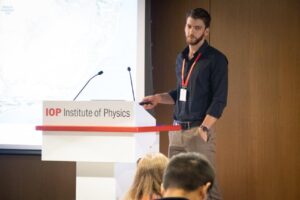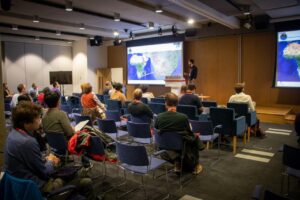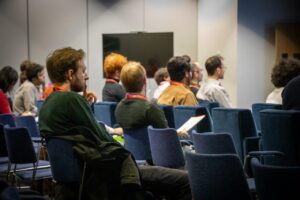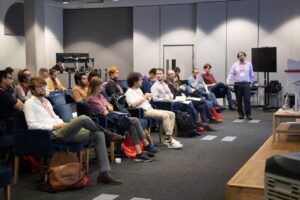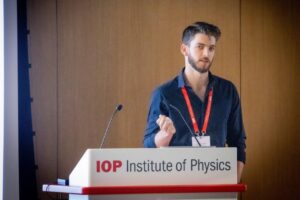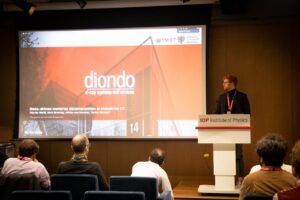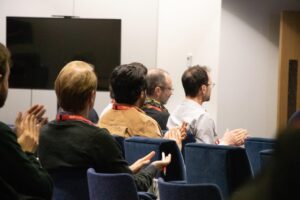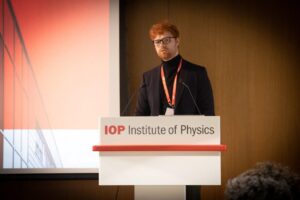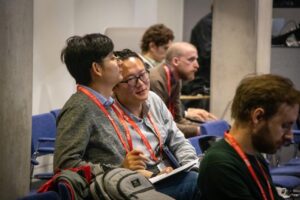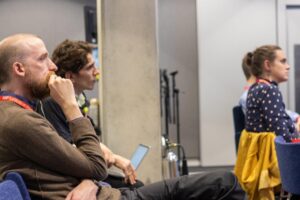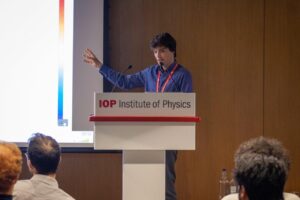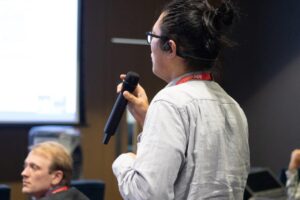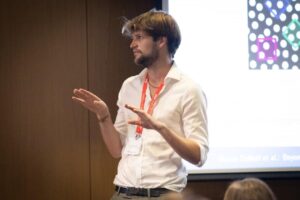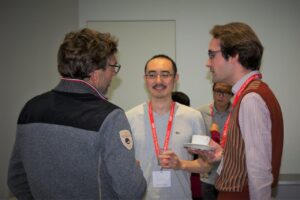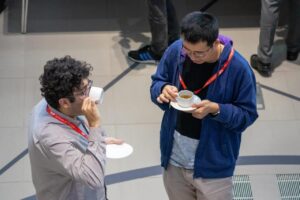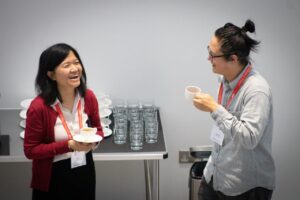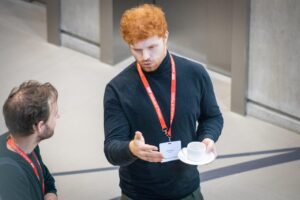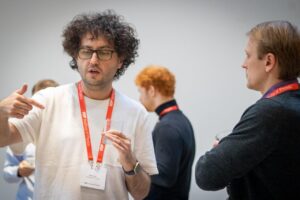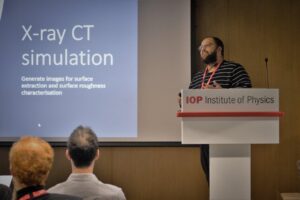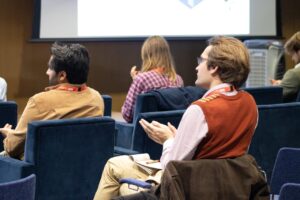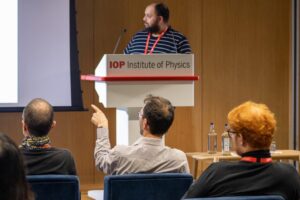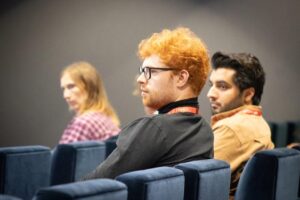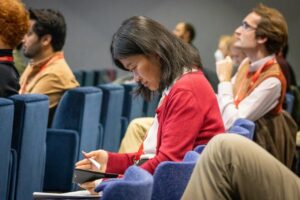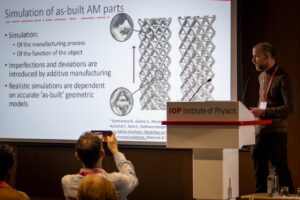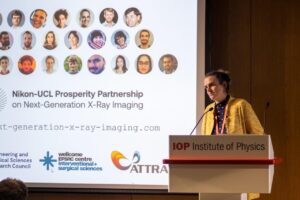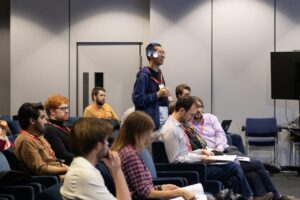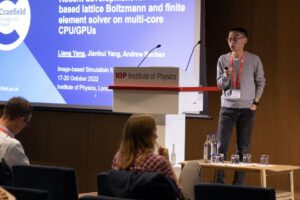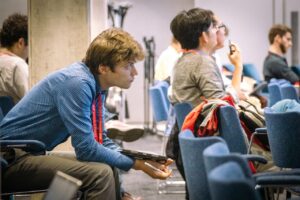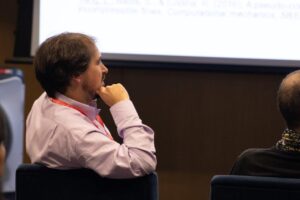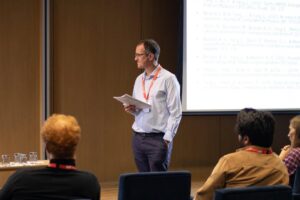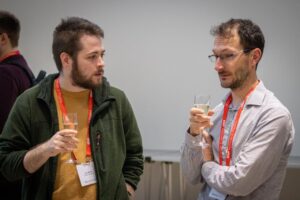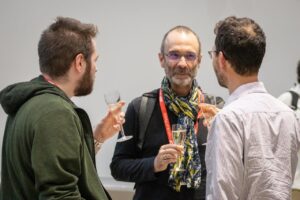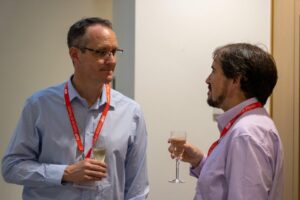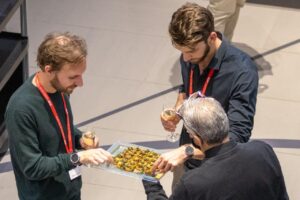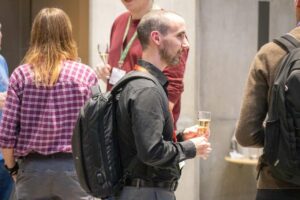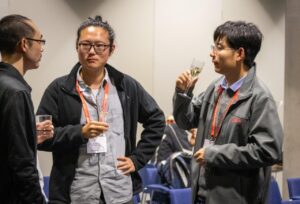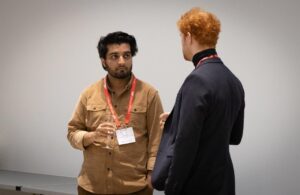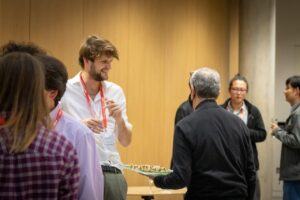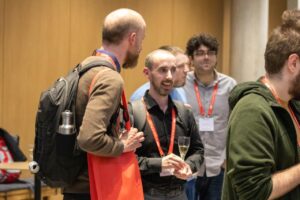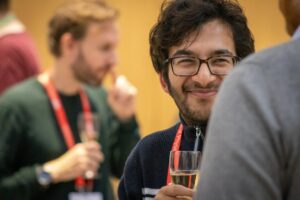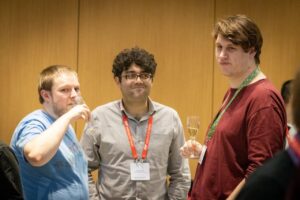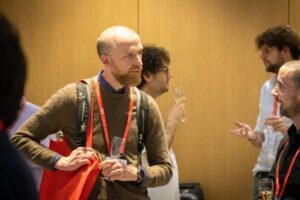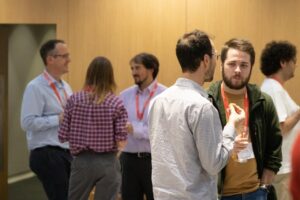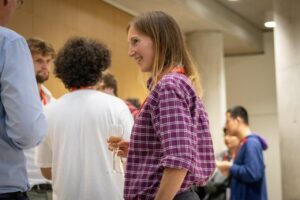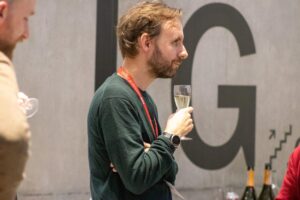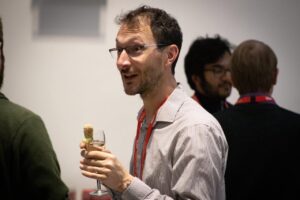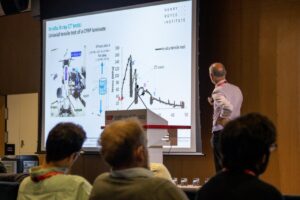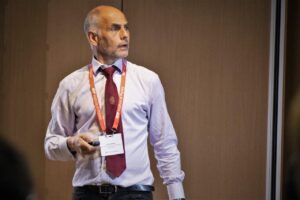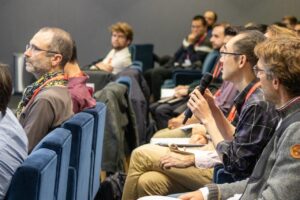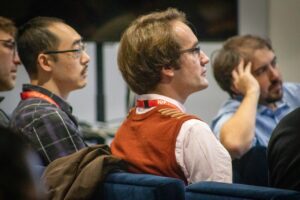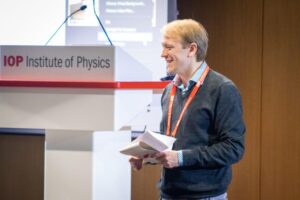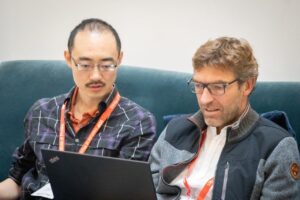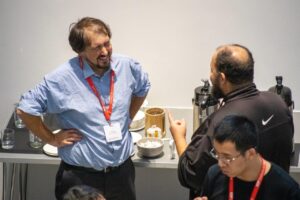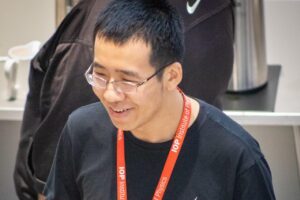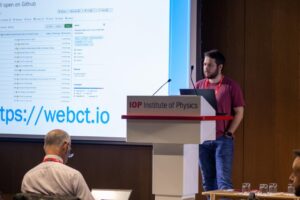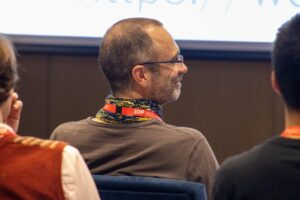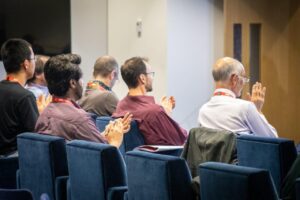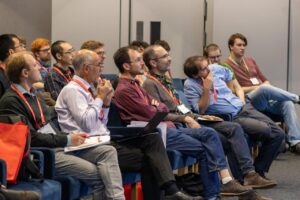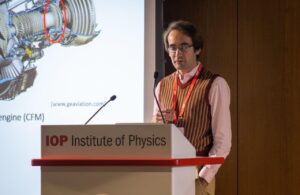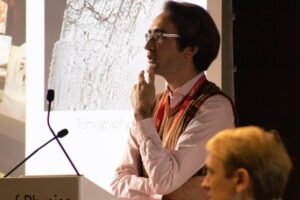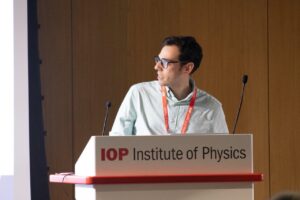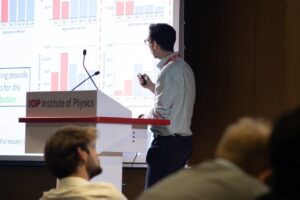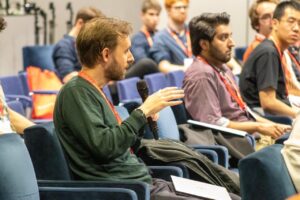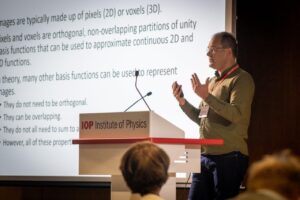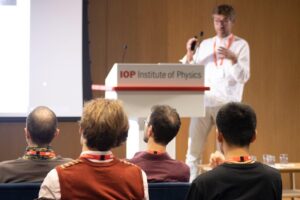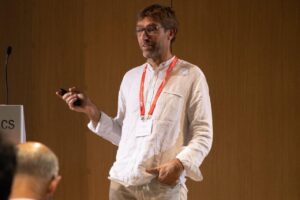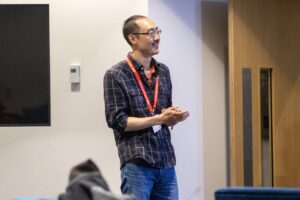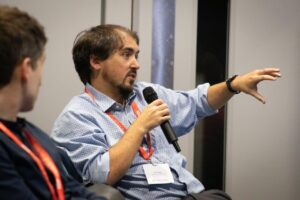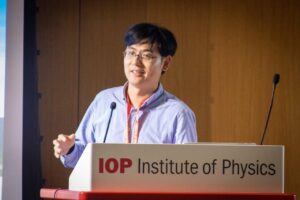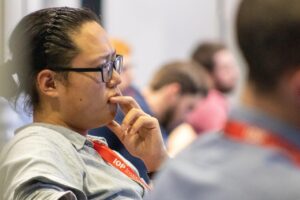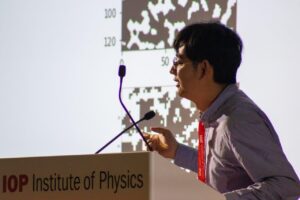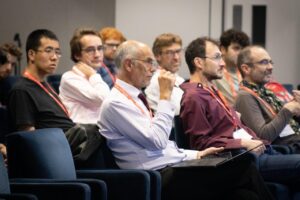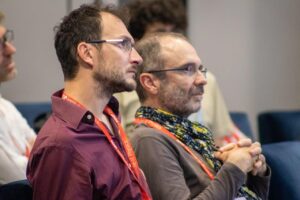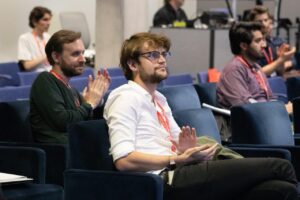Over the five days we had attendees representing academia, research centres, start-up companies, and large multinational corporations joining us. Once again, the training course (Day 1-2) was oversubscribed. The forum (Day 3-4) was well-attended by a mix of new and returning attendees. For the third time, the event was hosted by the IOP at their headquarters in London.
Keynote Speakers
Prof Jean-Charles Passieux, INSA Toulouse, France
Generation of analysis suitable B-Spline beam models from digital images

JC Passieux is a full professor of Computational Mechanics at INSA Toulouse, France. He develops high-performance computational methods (domain decomposition, reduced order models, local/global coupling, Isogeometric Analysis). He has contributed to the development of finite element-based and global digital image correlation (DIC) methods, identification from digital images, image-based models and data assimilation. He was co-chairman of the international conference Photomechanics 2018 in Toulouse. He is a member of the steering committee of the Computational Solid Mechanics Association (CSMA, France). He is one of the founding members of the French PhotoMechanics Association.
Dr Fabrice Pierron, Matchid NV, Belgium
Integrating 2D/3D images with numerical simulations for mechanical deformation analysis

Dr Fabrice Pierron has been a Professor of Solid Mechanics at the University of Southampton since 2012. He is a specialist in the integration of image-based deformation mapping (like digital image correlation) with inverse identification (like the Virtual Fields Method) to design the next generation of mechanical tests. He has published more than 150 journal articles. He was Editor-in-Chief of the journal Strain (Wiley) for ten years and is a co-founder of the company MatchID NV (Ghent, Belgium), for which he now also works as R&D Director since 2021. Prof. Pierron is a Fellow of the Society for Experimental Mechanics (SEM).
Additional Speakers
- Ander Biguri, University Of Cambridge
- Christian Breite, KU Leuven
- Koussay Daadouch, Ruhr University Bochum
- Dongze He, The University of Manchester
- Umeir Khan, University Of Bristol
- Rhydian Lewis, Swansea University
- Grammatiki Lioliou, University College London
- Harry Lipscomb & Marti Puig, University of Manchester
- Iwan Mitchell, Bangor University
- Subrata Mondal, University of Bath
- Tessa Nogatz, RPTU Kaiserslautern-Landau
- Fatima Zahra Oujebbour, CNESTEN
- Chris Packer, The University of Edinburgh
- Sylwin Pawlowski, University of Lisbon
- Connie Qian, The University of Warwick
- Dirk Schut, Centrum Wiskunde & Informatica (CWI)
- Elena Syerko, Nantes Université, École Centrale de Nantes
- Benjamin Thorpe, University of York
- Léonard Turpin, Diamond Light Source
- Fatih Uzun, The University Of Oxford
- Franck Vidal, Bangor University
- Walter Villanueva, Bangor University
- Moritz Weiss, Diondo / University of Wuppertal
- Liang Yang, Cranfield University
- Miroslav Yosifov, University Of Applied Sciences Upper Austria
Programme
Mon Oct 2023
From meshing to solvers for image-based computing:
Voxel and hex-dominated mesh generation and simulation for 3D images: training of voxel generator and hex-dominated mesh generator (ChopMesh), solver includes lattice Boltzmann (taichi-LBM3D), Finite Element (PyEFEM), and Finite volume (OpenFOAM) for coupled physical problems.
- 9:30 – Registration & Coffee
- 10:00 – Session 1
ChopMESH: Introduction to ChopMESH, voxel and voxel-dominated mesh generator - 11:00 – Session 2
Voxel based solver: taichi-LBM3D, PyEFEM and Wyvern - 12:30 – Lunch
- 13:30 – Session 3
Voxel based solver: more advanced simulations - 14:45 – Coffee
- 15:15 – Session 4
Voxel-dominated mesh on OpenFOAM - 17:00 – End
Tue Oct 2023
Image-Based Simulations with Fast Fourier Transforms (AMITEX):
AMITEX_FFTP is a distributed solver based on FFTs for non-linear mechanical simulations on heterogeneous unit-cells (described by regular 3D images). AMITEX_FFTP can be run either on individual PC, local clusters or on large High Performance Computing platforms to perform large scale simulations.
- 9:00 – Session 5
Introduction to AMITEX (overview and installation consideration) for the mechanical simulation of heterogeneous materials - 10:30 – Coffee
- 11:00 – Session 6
a) Geometry for AMITEX : definition and generation
b) First simple simulations - 12:30 – Lunch
- 13:30 – Session 6
Data inputs (description and examples):
a) Material definition
b) Loading and output
c) Algorithm parameters - 14:45 – Coffee
- 15:15 – Session 8
User-defined behaviours: umat and MFRONT - 17:00 – End
Wed Oct 2023
- 9:30 – Registration & Coffee
- 10:00 – Welcome
- 10:15 – Keynote 1
Fabrice Pierron, Matchid NV, Belgium
Integrating 2D/3D images with numerical simulations for mechanical deformation analysis - 11:00 – Session 1
Tessa Nogatz, RPTU Kaiserslautern-Landau, Germany
“Validation and Verification of Motion Estimation in In Situ Tests”Chris Packer, The University of Edinburgh, UK
“Linking Manufacturing to Porosity and Fatigue Performance in Ti-6Al-4V LPBF Produced Parts Using X-Ray CT Techniques”Alex Cornell-Thorne, Swansea University, UK
“Investigating the impact of workflow parameters for a semi-automated image-based simulation methodology using benchmark data based on an international tensile testing standard for metallic materials”Harry Lipscomb & Marti Puig, University of Manchester, UK
“Characterisation of Surface Roughness for Additive Manufacturing using Deep Learning and X-ray CT” - 12:30 – Lunch
- 13:30 – Session 2
Elena Syerko, Nantes Université, École Centrale de Nantes, France
“Results of the Meso-Scale Second Stage of the Benchmark Exercise on the Image-Based Permeability Prediction of Composite Reinforcements”Koussay Daadouch, Ruhr University Bochum, Germany
“Computational modeling of fiber-reinforced concrete on the mesoscale: from voxel-based image to finite element mesh”Moritz Weiss, Diondo / University of Wuppertal, Germany
“Data-driven Z-rho decomposition in industrial CT”Franck Vidal, Bangor University, UK
“New developments in gVirtualXray since IBSim 2021”Walter Villanueva, Bangor University, UK
“Melt infiltration into a Particle Bed” - 15:10 – Coffee
- 15:40 – Session 3
Rhydian Lewis, Swansea University, UK
“VirtualLab: A fully automated, open-source platform for virtual experiments”Benjamin Thorpe, University of York, UK
“Automating an image-based simulation workflow for component batches with VirtualLab”Umeir Khan, University Of Bristol, UK
“Preform Defect Identification of in-Factory Photographs”Dirk Schut, Centrum Wiskunde & Informatica (CWI), Netherlands
“Joint 2D parallel slice to 3D volume image registration applied to slice photographs and CT scans of apple fruit” - 17:00 – End
- 17:30 – Networking Reception
- 21:00 – Taxis
Thu Oct 2023
- 9:30 – Keynote 2
Jean-Charles Passieux, INSA Toulouse, France
“Generation of analysis suitable B-Spline beam models from digital images” - 10:15 – Session 4
Sylwin Pawlowski, University of Lisbon, Portugal
“CFD modelling of flow patterns, tortuosity and residence time distribution in monolithic porous columns reconstructed from X-ray tomography data”Liang Yang, Cranfield University, UK
“Hex dominated mesh generator for Image Based Simulation” - 10:55 – Coffee
- 11:25 – Session 5
Christian Breite, KU Leuven, Belgium
“Enhancing ultrafast in-situ synchrotron radiation computed tomography of composite failure by super-resolution”Ander Biguri, University Of Cambridge, UK
“Iterative reconstruction for large scale tomographic problems using TIGRE: discussion on image quality, scanning time and algorithms”Léonard Turpin, Diamond Light Source, UK
“Identification of a mechanically based interface from an in-situ experiment” - 12:25 – Lunch
- 13:25 – Session 6
Connie Qian, The University of Warwick, UK
“3D Fibre Architecture Characterisation for Advanced Carbon Fibre Composites through Robust CT Scanning Technology”Dongze He, The University of Manchester, UK
“Analysis of the performance of braided composite tubes through X-ray computed tomography image-based modelling enabled finite element analysis”Iwan Mitchell, Bangor University, UK
“Creating Functional Digital Shadows of X-ray systems”Miroslav Yosifov, University Of Applied Sciences Upper, Austria
“Generating Physics-Informed and Accurate Training Data through XCT Simulations for Deep Learning Applications” - 14:45 – Coffee
- 15:15 – Session 6
Fatih Uzun, The University Of Oxford, UK
“Voxel-based full-field Eigenstrain reconstruction of residual stresses”Grammatiki Lioliou, University College London, UK
“Two-directional phase sensitivity and isotropic spatial resolution in phase contrast CT: prospects for industrial applications”Fatima Zahra Oujebbour, CNESTEN, Morocco
“3D U-Net for automatic segmentation of volumes from Multi-energy X-ray Computed Tomography” - 16:15 – Wrap up
- 16:30 – Close
Fri Oct 2023
An entire day dedicated to exploring opportunities for collaboration. This may be to build teams for writing funding proposals, solving particular challenges, round-robin testing, seeking expertise to complement an existing research team, or other activities of a similar nature.
Since its inception, a primary aim of the IBSim-4i event series has been to foster networking and building of working relationships, particularly between industry and academia. This dedicated collaboration workshop is standalone from the rest of the IBSim-4i week, and interested parties may attend for this day alone if desired. We particularly encourage those planning to attend to invite other potential stakeholders and look forward to exploring R&D opportunities with you and your colleagues.
Themes for 2023:
- Working with large datasets (TBs), e.g., those generated at synchrotrons
- Composite materials
- Material Testing 2.0: the next generation of material test based on deformation imaging
- IBSim benchmarks preparing for ‘Digital Twins’
- 9:30 – Session 1
Personal introductions– 3-4 minute intro presentations (strict timing, pdf pre-submitted)
* Your research interests & expertise
* Research team & facilities available to you
* Particular topics you would like to be involved in
- 10:45 – Coffee
- 11:15 – Session 2
Theme introductions & Identifying research challenges– Pre-appointed theme leaders to give 10-15 minute overview
– Round-robin post-it session leaving project ideas / research challenges on whiteboards
- 12:30 – Lunch
- 13:30 – Session 3
Research prioritisation– People are free to choose which theme to be stationed at
– Groups discuss which post-it ideas to focus on
– Theme leads report back to the room
- 14:45 – Coffee
- 15:15 – Session 4
Cementing actions– People can either stay at the same theme or move after hearing the prioritised ideas (they could let more than one theme know that they’re interested to be involved)
– Formulate teams to collaborate after the event, e.g., write proposals, (sub-teams within themes might be needed)
– Discuss action plans for follow-up
– Report back to the room
- 16:30 – Close
Recordings [Day 3]

